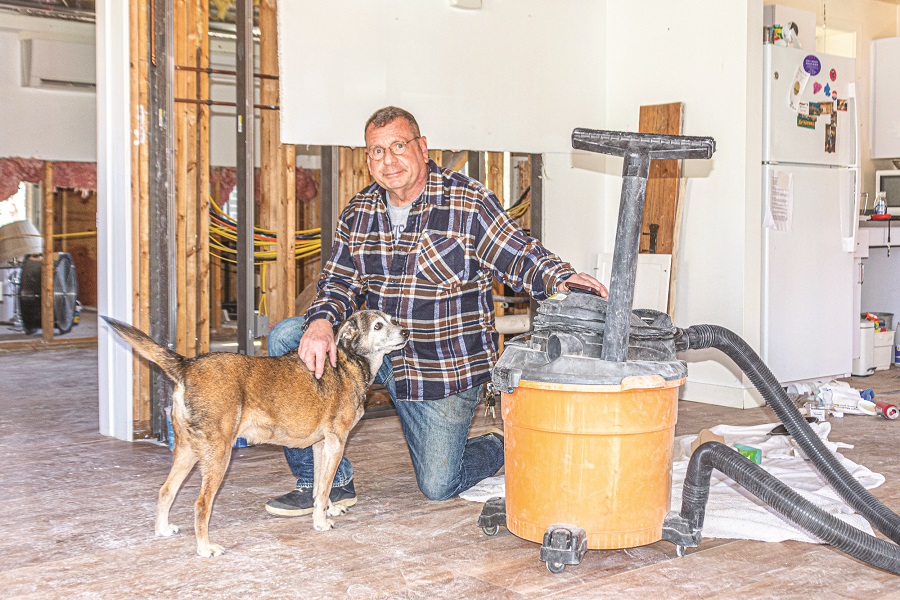PROVINCETOWN — The owners of East End properties that were flooded by wind-driven seawater during a December storm continue to struggle to get their buildings dried out, wiring and plumbing repaired, and walls and flooring replaced. At least two tenants are still without permanent housing as a result. Meanwhile, other flooding that came after pipes froze and burst during the February cold snap has forced tenants from four apartments in the West End.
Some have repair costs or temporary lodgings covered by insurance. Others are reaching deep into their pocketbooks or draining their savings accounts and struggling to recover.
While the physical and psychological stress still runs deep, one common emotion among those who have been displaced appears to be gratitude for the support they have received from their fellow townspeople.
One Person Back Home
“The water came so fast, there was nothing you could do but get out of the way,” said Erna Partoll, an artist who has owned her Howland Street home for 52 years. The house sits on a slab with no crawl space. As the water on her main level rose, Partoll retreated upstairs. “I looked out and there was a fireman in the back yard,” she said. “They came into the house and carried me out.”
Friends quickly came to Partoll’s aid. Gallery owner Berta Walker, who lives in North Truro, took her in for the first three weeks. “It was wonderful; I was safe and warm,” Partoll said. Meanwhile, a friend who knew a local contractor contacted him; soon cleanup and repairs were underway.

Partoll has a studio on the ground level, which was flooded with seawater. “Berta’s gallery is very close by,” Partoll said, “so they packed up all my artwork and took it over there.”
A friend called a neighbor who was out of town to ask if Partoll could stay there. “By all means, have her come,” was the answer.
The local Council on Aging checked in periodically. “Sometimes just to be able to talk to someone is helpful, and to know there are places you can go to ask for help,” Partoll said.
The resilient 90-year-old is now back in her home and will celebrate her 91st birthday in about a month. She is filled with gratitude. “How people came to assist — all the neighbors and friends — it was really wonderful,” she said.
Things have been more difficult for Partoll’s neighbor Jeanmarie Kaeselau, who lives on Bradford Street. She lost three vehicles, a motorcycle, and a shed. The house has a two-bedroom apartment in the basement, there since the 1930s or 1940s, which was filled with seawater, sludge, and debris.
Tenants Michael Fernandes, a 78-year-old who is in a wheelchair, and his husband, Susumu Kishihara, were safely brought out. But they lost many belongings and cannot return home.
Kaeselau’s basement remains uninhabitable. While she has FEMA flood insurance, she said, it didn’t cover the basement because it was six inches below grade. So far, she has spent about $32,000 on repairs and she doesn’t plan to replace the apartment. “The cellar is bare bones concrete again and it’s going to stay that way,” Kaeselau said.
After the storm water receded, Kaeselau and her sons Dylan, 26, and Brenden, 23, have worked through the spells of cold weather, using buckets to bail out the salt water; they’ve emptied the basement’s contents, pulled out the carpeting and walls in the apartment, and cleaned out a shed, where a set of drums was ruined. Eversource has only partially restored electricity to the main house.
Disaster cleanup experts, who helped with drying out and mold remediation, were an $11,000 expense. Plumbers were another $6,000. Supplies like sheetrock, plywood, and boxes of nails have also been costly.
As happened with Partoll, friends have stepped in to help. A GoFundMe page raised $20,000 in a few days, helping Kaeselau pay for the disaster remediation and the plumber. Passersby have given her money to help pay for repairs. One person gave her $1,000.

When Public Works Director Jim Vincent was in the neighborhood, “He saw me on my knees shredding carpet,” Kaeselau said. He went to the hardware store, came back with supplies, and pitched in.
“I’m forever grateful to the townspeople,” she said.
Still, Fernandes and Kishihara, who lived in Kaeselau’s basement apartment for more than 10 years, fear they will be forced to leave their beloved Provincetown.
Fernandes said they felt like family at the Kaeselaus, where they watched the sons grow into adulthood. When they fled their flooded apartment, Kishihara grabbed cash, Fernandes’s medication, and his mother’s ashes. He went back the next day to retrieve his credit cards and green card from the murky water.
The couple is currently staying in a friend’s basement bedroom, but it is available only until the end of April. Their belongings fit in a handful of cartons that line the walls of their temporary quarters. Their search for a year-round apartment in Provincetown has expanded to include the other towns of the Outer Cape.
A few weeks ago, they discussed a possible last resort: Fernandes would go into a nursing home, and Kishihara, who doesn’t want to live alone in the U.S. without Fernandes, would return to Japan.
Fernandes has lived in Provincetown for the last 24 years. He has served on the town’s disabilities commission and a few search committees for town manager. Kishihara moved to Provincetown in 2009 to be with Fernandes, and the two have since married.
Once they had been rescued from the rising seawater, the couple stayed for a few days at the Crown & Anchor, where owner Jonathan Hawkins offered rooms free of charge to those who had been displaced. Friends came to offer their support in the form of hot meals. “Someone even bought us clothes,” Fernandes said.
When Kishihara would weep, people assumed his tears were for the couple’s plight. They were his reaction to the outpouring of kindness, Fernandes said.
A GoFundMe page started by the board at Fernandes’s church, the Unitarian Universalist Meetinghouse of Provincetown, has raised $50,000 for the couple. Fernandes asked a real estate agent whether that might be enough for a down payment on a very small house but was told that even really small houses start at about $750,000.
Renters in Provincetown used to make up a large part of the workforce and were considered major contributors to the fabric of the town, Fernandes said. “The renter is no longer respected,” he said. He worries people believe “there’s no reason for us to be part of the town.”
Displaced at Harbor Hill
Record low temperatures caused a copper pipe to burst in a third-floor unit at Harbor Hill on Feb. 5, damaging that unit and three below it and displacing tenants from all four apartments.

Adam Howard, a disabled veteran who lives with his 13-year-old dog in a ground-floor accessible unit, was one of those flooded out. He woke to an unfamiliar sound that night and opened the bedroom door to find water pouring through the light fixtures in the main room. He called the answering service for the complex but was told everyone was busy with emergency calls. Then he called the local fire dept.
“I grabbed the photo albums, important documents, and my laptop,” he said. “I was literally throwing stuff into the car.”
Howard, one of the first tenants in the complex the town purchased four years ago, calls himself “the Gladys Kravitz of Harbor Hill” since he sees everything that goes on from his ground-level unit. His dog, Grafton, is a frequent visitor at the dog park where she is often referred to as Granny.
Howard was lucky. He had purchased renter’s insurance. The night of the flood, he and the dog moved into a room in a Hyannis hotel, where they remain. The insurance company moved all his belongings to outdoor containers, pays for the hotel, and is providing an allowance for food. He has paid about $2,000 in deductibles, but insurance has covered the rest.
One other tenant had renter’s insurance and is staying at a friend’s. The other two tenants were not insured.
Since a couple of units were recently vacated and had not yet been rented, the Community Development Partnership, which manages Harbor Hill for the town, offered them to those who were displaced. One tenant has taken the CDP up on the offer, while the second made other arrangements.
Howard is frustrated with the lack of progress on repairs. So far, the apartments have been emptied and the walls have been torn out. Heavy-duty fans run continuously to keep the units dry.
According to Michelle Jarusiewicz, Provincetown’s housing specialist, progress is slow because the freeze left so many places along the Massachusetts coast in need of repair.
Knowing demand for emergency repair skills is outstripping supply, Howard wondered aloud whether crews might be hired from out of state. But because the project is municipally-owned, the work must be awarded through a bidding process. “The CDP and the town are working together to make this happen as quickly as possible,” Jarusiewicz wrote in an email to the Independent.
“While waiting for the remediation phase to begin, bid specifications are being done for construction to start thereafter,” she wrote. But “given the high demand of all this work, we are reluctant to estimate a completion date.”
Harbor Hill’s insurance does not cover personal items or alternative housing, said Jarusiewicz. Displaced tenants won’t be charged rent while their units are under repair, and the electric bills they pay will be reimbursed. Any rent increase for 2023 will also be waived, she said.
